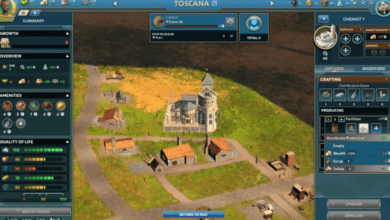Metaphor: ReFantazio – RPG That Pushes the Boundaries of Storytelling and Gameplay
What lessons do we learn from our favourite pieces of fiction? Is it all just about escapism and fun, or can these stories have a profound effect on our lives? After playing nearly every RPG from Atlus, I can confidently say the answer is a resounding “Yes.” Fiction, particularly in the realm of RPGs, can move beyond mere entertainment, offering impactful insights about the world and ourselves. Metaphor: ReFantazio is one such game. With its deeply political narrative, this fantasy RPG not only serves as an engaging experience but also as a thoughtful reflection on the best and worst parts of humanity.

A Story Rooted in Reality
At the heart of Metaphor: ReFantazio is the Kingdom of Euchronia, a cold-hearted and brutal land where a young man’s journey begins. The game kicks off with a high-stakes political drama: the reigning king has been murdered, his only son lies in a curse-induced coma, and a magical election has begun. As one of the candidates vying for the throne, your character navigates a land rife with racism, inequality, poverty, religious extremism, and exploitation.

The game’s political themes are front and center, and they aren’t just superficial. Atlus uses the setting and characters to express progressive politics, touching on real-world issues. As you travel the kingdom and gather allies, you see firsthand the struggles of those marginalized by the system. The writing doesn’t hide its message, making it clear that change is needed in this unjust society. In many ways, the game’s unfiltered approach to these topics works to its advantage, creating a powerful narrative that feels relevant to our world today.
The Familiar and the New
If you’ve played Persona or Shin Megami Tensei, you’ll recognize many familiar mechanics in Metaphor. The calendar system, a staple of Persona, makes a return, where you balance your time between building relationships, exploring dungeons, and progressing the main story. But what sets Metaphor apart is how these systems have been refined. The Bond/Follower and Royal Virtue systems are streamlined versions of Persona’s social links and stats, offering clearer paths to levelling up and progressing.

This clarity enhances the gameplay, incentivizing players to engage with every aspect of the game. As you build bonds with people from all walks of life each one a victim of the kingdom’s injustices you’re not just playing a game; you’re part of a story about uplifting the downtrodden and gaining the trust of those who need it most.
Sidequests and Combat: More Than Just Filler
The game’s sidequests are more than just distractions; they’re opportunities to dive deeper into the world and its issues. Whether you’re hunting bounties or helping NPCs, these quests often take you into optional dungeons filled with tough enemies. While dungeon layouts can become repetitive, the variety in enemies and the rewards you receive (such as money, gear, and experience points) make these excursions worthwhile.

The combat system is another area where Metaphor shines. It uses the SMT press-turn system, where exploiting elemental weaknesses grants extra turns. What sets it apart, however, is the Archetype system, which allows any character to adopt different class roles and even mix skills between them. This flexibility opens up countless strategies, particularly with Synthesis attacks, which combine multiple Archetypes’ abilities to create devastating moves.

As you progress through the game, unlocking advanced Archetypes with complex mechanics, the combat becomes a puzzle in itself, challenging you to find the most effective strategies for each battle. The result is a system that feels fresh while retaining the depth and complexity that fans of Atlus RPGs have come to expect.
Streamlined Systems for a Smoother Experience
One of the biggest improvements in Metaphor is how it minimizes the grind often associated with turn-based RPGs. The game introduces a simple real-time action mechanic where you can attack enemies before combat begins, giving you the upper hand or even avoiding turn-based battles altogether with weaker enemies. Additionally, Metaphor is generous with items that allow you to level up Archetypes outside of combat, streamlining progression and keeping the gameplay moving at a steady pace.

This is where Metaphor truly stands out: everything in the game feels like it serves a purpose. From combat to social interactions, every system feeds into the overarching narrative and themes. The game respects your time, offering a tight, cohesive experience that keeps you engaged from start to finish.
A World of Striking Visuals and Music
Atlus has always been known for its distinctive art style, and Metaphor is no different. The gothic-inspired menus, grotesque yet beautiful character designs, and imaginative boss creatures give the game a unique visual identity. Inspired by works like Bosch’s Garden of Earthly Delights, Metaphor presents a world that is both deranged and breathtakingly beautiful.

The visuals are supported by a fantastic orchestral soundtrack composed by long-time Persona composer Shoji Meguro. Unlike his previous works, Metaphor leans more into classical music with dramatic opera-style vocals. While it may take some getting used to, the soundtrack eventually sticks with you, becoming an integral part of the game’s identity.
The Message at the Heart of Metaphor
At its core, Metaphor is a game about defying circumstances and pushing for collective action to create a better world. Its empathetic portrayal of belief systems, its critique of manipulative power structures, and its exploration of faith all contribute to a nuanced narrative that doesn’t shy away from difficult topics.

Even though the game can be idealistic at times, it doesn’t gloss over the harsh realities of fighting for change. Metaphor acknowledges the complexity of these struggles while still holding onto a sense of hope. The characters you meet along the way, each with their own tragic backstory and unique perspective, help drive home the game’s central message: diversity is humanity’s greatest strength.
A Journey Worth Taking
In 2024, a year filled with personally affecting stories in games, Metaphor: ReFantazio stands out as a special experience. It doesn’t just resonate in specific moments; it serves as a reminder that the world is bigger than our individual struggles, and that change is possible if we work together. It’s a game that speaks to the power of fiction, showing that even far-fetched fantasy stories can inspire us to make our reality a better place.

A New Standard for RPGs
With Metaphor: ReFantazio, Atlus has created an RPG that pushes the boundaries of what the genre can achieve. Its blend of familiar mechanics and new innovations, combined with a story that tackles real-world issues, makes it one of the most compelling games of the year. For fans of Persona and Shin Megami Tensei, this game is a must-play. But even for those new to Atlus’ work, Metaphor offers an experience that is as thought-provoking as it is entertaining.

In a world that often feels overwhelming, Metaphor: ReFantazio reminds us that, no matter how small our efforts may seem, we can always strive for something better. And sometimes, it’s the stories we play that give us the strength to do just that.






